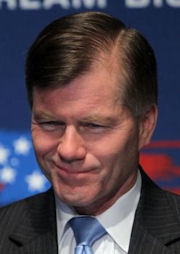by James A. Bacon
Gov. Bob McDonnell has submitted his amendments to the landmark transportation-funding legislation passed by the General Assembly earlier this year. His proposals tweak the bill — reducing the annual fee on alternative-fuel vehicles from $100 to $64, for instance — without altering the substance. Among the more notable changes, the governor attempts to “improve the legal posture” of regional transportation taxes to skirt constitutional issues raised by Attorney General Ken Cuccinelli.
These changes are nothing to celebrate — if adopted by the General Assembly, they will render a bad bill a little less bad. What concerns me most is that McDonnell repeats unsubstantiated talking points, which, if allowed to propagate unchallenged, will lead to more pernicious legislation in the future.
Jobs and economic-activity argument. In his press release today, the governor says, “This long-term transportation plan will generate thousands of jobs, create hundreds of millions of dollars in economic activity and provide the Commonwealth with the transportation infrastructure necessary to grow and prosper in the decades ahead.”
There is not a scintilla of evidence that this tax hike/restructuring plan will create either jobs or economic activity. True, the measures potentially will raise some $860 million a year that will be spent on highly visible transportation projects such as widening I-64 between Newport News and Williamsburg, widening Route 28 in Northern Virginia, bringing Amtrak service to Roanoke, and helping to build the Coalfields Expressway in Southwest Virginia, all of which will create jobs.
But the legislation also raises taxes. Those taxes will come from individual Virginians who would have spent $860 million on other goods and services, which also would have supported jobs and economic activity. The only way one could argue that higher taxes would create new jobs and economic activity, as opposed to shifting them from one sector of the economy to the other, is if the investments stimulated economic economic activity that would not have occurred otherwise. But there is simply no way to know if will happen.
Indeed, a case can be made that the tax increase will be economically destructive. In a previous post, “What Will We Get for that Transportation Tax Increase,” I suggested that, by reducing congestion costs, the transportation improvements might generate a 2.1% return on investment, which is below the cost of capital, hence destructive of wealth. And that’s optimistic. My calculations took no account of the well-documented phenomenon of “induced demand,” in which the addition of new transportation capacity induces more driving and, after a delay, erases the reductions in congestion.
The cost-of-delay argument. McDonnell also reiterated this statement: “If we do not act now to solve the Commonwealth’s transportation funding problem, the cost of delay will be much higher in the future.” Says who? Such logic assumes that in a weak global economy, construction costs will increase like they did in the 1990s and 2000s. One could make the alternate case that, as the economies of China, India and other fast-growth countries cool off and as Europe struggles with the euro, global economic growth will slow, price pressures will be deflationary, and construction prices will decline. There simply is no way of knowing for certain.
Investing in the wrong projects. The most important question of all goes unaddressed — are we investing in the right projects? Will growth and development in Virginia resume the suburban-sprawl pattern of the two decades preceding the recession or will profound economic and demographic shifts push the preponderance of growth back toward the urban core? The McDonnell administration has steadfastly refused to even consider that possibility. The governor is promoting projects conceived in the 2000s real estate bubble that have worked their way through the tortuous road-approval process and are now ready for funding. But the world has changed dramatically in the past 10 years. What may have made sense then does not necessarily make sense now.



